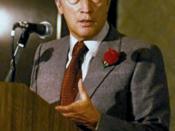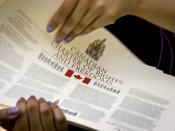Throughout Canadian history, the idea of national unity has been challenged numerous times, mainly by conflicts between English and French Canadians. In the past half-century, however, the issue of Western alienation from federal politics has developed into a significant obstacle to Canadian unity. While the government of Pierre Elliott Trudeau was in power, its main focus was on resolving these conflicts to bring about a true sense of national unity, without the regionalism that was and still is plaguing our country today. Although its efforts at reconciling the conflicts between the English and French, and the West and the East were made in good faith, many of those efforts ended up backfiring. Some examples of actions that did not work out as planned for the Trudeau government include the Parti Québecois' 1980 referendum on separation, the enactment of the Official Languages Act and the Charter of Rights and Freedoms to secure French language rights, and the National Energy Program, which was meant to share Alberta's wealth with the rest of the nation.
On November 15th, 1976, René Levésque was elected as Premier of Québec. His party, the Parti Québecois, had been born out of former Premier Duplessis' Union Nationale as a separatist party. Levésque's entire government platform was based on "negotiating a new relationship with Ottawa", which basically meant having Québec separate politically from Canada, but still maintain economic ties. In 1980, Levésque called a referendum on separation for Québec. Before the referendum, Trudeau spoke out publicly against separation. He knew that if the separatist movement was ever going to be stopped, then the federal government would have to stop ignoring Québec's demands. Although Trudeau opposed separation, Trudeau was still a Québecer, and he warned English Canada "We will not agree to you interpreting a 'no' vote as an indication...


